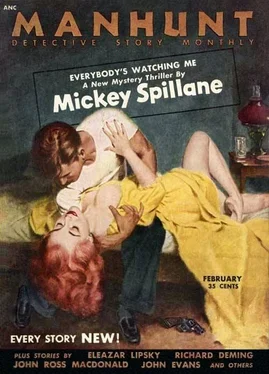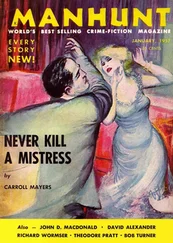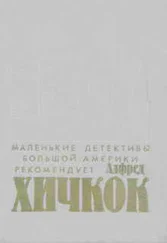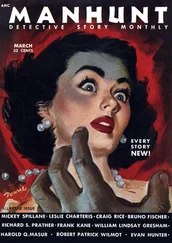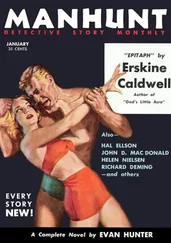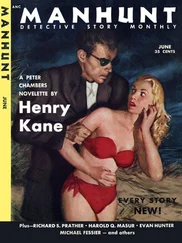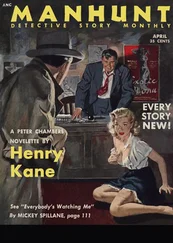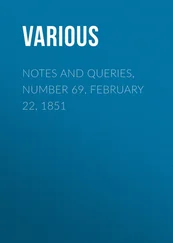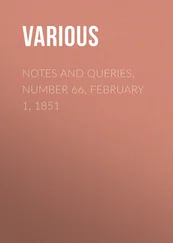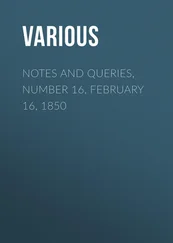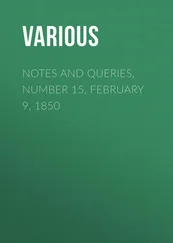Ричард Деминг - Manhunt. Volume 1, Number 2, February, 1953
Здесь есть возможность читать онлайн «Ричард Деминг - Manhunt. Volume 1, Number 2, February, 1953» весь текст электронной книги совершенно бесплатно (целиком полную версию без сокращений). В некоторых случаях можно слушать аудио, скачать через торрент в формате fb2 и присутствует краткое содержание. Город: New York, Год выпуска: 1953, Издательство: Flying Eagle Publications, Жанр: Детектив, на английском языке. Описание произведения, (предисловие) а так же отзывы посетителей доступны на портале библиотеки ЛибКат.
- Название:Manhunt. Volume 1, Number 2, February, 1953
- Автор:
- Издательство:Flying Eagle Publications
- Жанр:
- Год:1953
- Город:New York
- ISBN:нет данных
- Рейтинг книги:4 / 5. Голосов: 1
-
Избранное:Добавить в избранное
- Отзывы:
-
Ваша оценка:
- 80
- 1
- 2
- 3
- 4
- 5
Manhunt. Volume 1, Number 2, February, 1953: краткое содержание, описание и аннотация
Предлагаем к чтению аннотацию, описание, краткое содержание или предисловие (зависит от того, что написал сам автор книги «Manhunt. Volume 1, Number 2, February, 1953»). Если вы не нашли необходимую информацию о книге — напишите в комментариях, мы постараемся отыскать её.
Manhunt. Volume 1, Number 2, February, 1953 — читать онлайн бесплатно полную книгу (весь текст) целиком
Ниже представлен текст книги, разбитый по страницам. Система сохранения места последней прочитанной страницы, позволяет с удобством читать онлайн бесплатно книгу «Manhunt. Volume 1, Number 2, February, 1953», без необходимости каждый раз заново искать на чём Вы остановились. Поставьте закладку, и сможете в любой момент перейти на страницу, на которой закончили чтение.
Интервал:
Закладка:
The Plymouth was still parked across from 8789, and I was in it, knowing suddenly who had killed Amos Spain and why Spain had been wearing what he wore and why he wasn’t wearing what he hadn’t worn. It was knowledge built piece by piece on what I had seen and heard from the moment I walked in and found the body on the couch. It was the kind of knowledge you can get a conviction with — if you have that one key piece.
The key piece was what I didn’t have.
Now and then a car came into the wide driveway and stopped at one of the entrances to let somebody out or to pick somebody up. None of them was for the rat hole to which I was glued. A delivery truck dropped off a dinette set a couple of doors down and I couldn’t have cared less.
I lighted another cigarette and crossed my legs the other way and thought about hunting up a telephone and calling Lund and telling him to come out and get the knife artist and sweat that key piece out in the open. Only I didn’t want it that way. This was one I wanted to wrap up myself. It had been my office and my couch and almost my client, and I was the one the cops had tromped on. Not that the tromping had amounted to much. But even a small amount of police displeasure is not what you list under assets.
Another twenty minutes floated by. They would still be up there in that apartment wearing a path in the rug. Waiting, sweating blood, hanging on desperately, risking the chance that I had known more than I let on and was already out yelling for the cops.
I would have loved to know what they were waiting for.
When the break did come I almost missed it. An ancient Ford with a pleated front fender wheezed into the curb. A hatless young man in a rained-on gray uniform got out to look at the number over the entrance to 8789. He had a damp-looking cigarette pasted to one corner of his mouth and a white envelope in his left hand. The local postoffice dropping off a piece of registered mail.
And then I remembered Mrs. Monroe’s first question.
I slapped open the glove compartment and got out my gun and shoved it under the band of my trousers while I was reaching for the door. I crossed the roadway at a gallop and barged into the foyer just as the messenger took a not too clean thumb off the button for 3C. I made a point of getting out my keys to keep him from thinking Willie Sutton was loose again.
He never even knew I was in town. He said, “Postoffice; registered letter,” into the tube and the buzzer was clattering before he had the last word out. He went through and on up the steps without a backward glance.
The door was off the latch, the way I had left it earlier. By the time the door to 3C opened, I was a few feet away staring vaguely at the closed door to 3B and trying to look like somebody’s cousin from Medicine Hat. The uniformed man said, “Amos Spain?” and a deeper voice said, “I’m Mr. Spain,” and a signature was written and a long envelope changed hands.
Before the door could close I was over there. I said, “It’s me again.”
He was a narrow-chested number with a long sallow face, beady eyes, a thin nose that leaned slightly to starboard, and a chin that had given up the struggle. Hair like black moss covered a narrow head. This would be Tom Monroe, the husband.
Terror and anger and indecision were having a field day with his expression. His long neck jerked and his sagging jaw wobbled. He clutched the edge of the door, wanting to slam it but not quite daring to. The silence weighed a ton.
All this was lost on the messenger. He took back his pencil and went off down the hall, his only worry the number of hours until payday. I leaned a hand against the thin chest in front of me and pushed hard enough to get us both into the room. I shut the door with my heel, said, “I’ll take that,” and yanked the letter out of his paralyzed fingers. It had sealing wax along the flap and enough stamps pasted on the front to pay the national debt.
Across the room the girl in the flowered housecoat was reaching a hand under a couch pillow. I took several long steps and stiff-armed the small of her back and she sat down hard on the floor. I put my empty hand under the pillow and found a snub-nosed Smith & Wesson .32, all chambers filled and dark red nail polish on the sight. I held it loosely along my leg and said, “Well, here we are,” in a sprightly voice.
Monroe hadn’t moved. He stared at me sullenly, fear still flickering in his small nervous eyes. The girl climbed painfully to her feet, not looking at either of us, and dropped down on the edge of a leather chair and put her face in her hands.
The man’s restless eyes darted from me to the girl and back to me again. A pale tongue dabbed furtively at lips so narrow they hardly existed. He said hoarsely, “Just what the hell’s the bright idea busting in here and grabbing what don’t belong to you?”
I flapped the envelope loosely next to my ear. “You mean this? Not yours either, buster.”
“It belongs to my father-in-law. I simply signed for it.”
“Oh, knock it off,” I said wearily. “You went way out of your league on this caper, Tom. You should have known murder isn’t for grifters with simple minds.”
A sound that was half wail, half sob filtered through the girl’s fingers. The man said absently, “Shut up, Cora.” His eyes skittered over my face. “Murder? Who’s talking about murder? You the one who shoved in here a while ago and told Cora about Amos Spain?”
“I wasn’t telling her a thing,” I said. “She knew it long before. You told her.”
“You might like to try proving that,” he said.
“You bet,” I said. I put the gun on the couch arm and looked at the envelope. Yesterday’s postmark, mailed from New York City. Addressed in a spidery handwriting, with the return address reading: “B. Jones, General Delivery, Radio City Station, New York, N. Y.” I ripped open the flap and shook out the contents. A plain sheet of bond paper wrapped around three odd-looking stamps. One was circular with a pale rose background and black letters. The other two were square, one orange and one blue, with the same crude reproduction of Queen Victoria on both. All three wouldn’t have carried a postcard across the street.
Monroe was staring at the stamps and chewing his lip. He looked physically ill. The girl was watching me now, her fingers picking at the edge of the housecoat, her face white and drawn and filled with silent fury.
I said, “It would almost have to be stamps. I should have guessed as much two hours ago. How much are they worth?”
“How would I know?” Monroe said sulkily. “They weren’t sent to me. I never saw them before.”
I slid the stamps back into the envelope and put the envelope in my pocket. “You’d know, brother. If you’d kept a better eye on Amos Spain you might even have gotten away with the whole thing.”
“You’ve got nothing on us. Why don’t you just shove off?”
“I’ve got everything on you,” I said. “Not that I deserve any credit. The Army mule could have done the job. I can give you the State Attorney’s case right now.”
I picked up the gun and swung it lightly between a thumb and finger and sat on the couch arm. Rain beat against the windows in a muted murmur. From the kitchen came the lurch and whine of the refrigerator motor.
“Somebody named B. Jones,” I said, “gets hold of some rare stamps. Illegally. Jones knows there are collectors around who will buy stolen stamps. Amos Spain is such a collector. A deal is made by phone or letter and the stamps are mailed to Spain. In some way you two find out about it. After the stamps are in the mail, perhaps. No point in trying to get them away from Uncle Sam; but there’s another way. So the two of you show up here early this morning and force your way in on old Amos, who is still in bed. You tie him up a little, let’s say, and gag him, leave him on the bed and come out here in the living room to wait for the postman with the stamps.
Читать дальшеИнтервал:
Закладка:
Похожие книги на «Manhunt. Volume 1, Number 2, February, 1953»
Представляем Вашему вниманию похожие книги на «Manhunt. Volume 1, Number 2, February, 1953» списком для выбора. Мы отобрали схожую по названию и смыслу литературу в надежде предоставить читателям больше вариантов отыскать новые, интересные, ещё непрочитанные произведения.
Обсуждение, отзывы о книге «Manhunt. Volume 1, Number 2, February, 1953» и просто собственные мнения читателей. Оставьте ваши комментарии, напишите, что Вы думаете о произведении, его смысле или главных героях. Укажите что конкретно понравилось, а что нет, и почему Вы так считаете.
